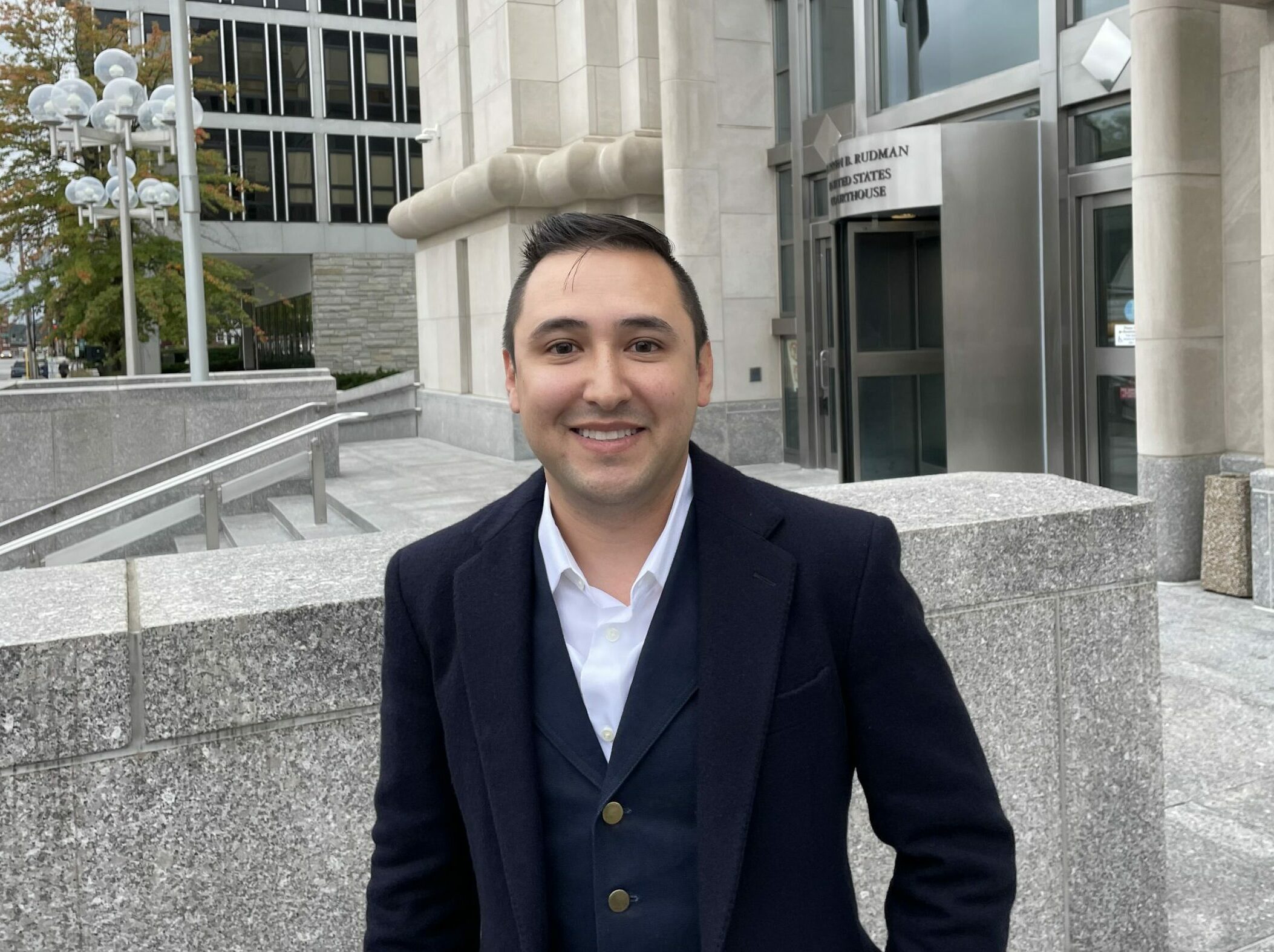Republican presidential candidate John Castro has no campaign office in New Hampshire, no campaign staff, has met with no voters in the first-in-the-nation primary, and his campaign fund boasts a whopping $670.
The tax-lawyer-turned-social-media-political-activist claims former President Donald Trump is costing him votes and donations, and he is suing the New Hampshire Secretary of State to keep Trump off the ballot.
Castro brought his low-budget road show to the United States District Court in Concord on Friday to argue before Judge Joseph Lapante that he has the legal standing to engage in the lawsuit by virtue of being a presidential candidate.
But Trump’s lawyers said Castro’s presidential campaign was a stunt meant to create cover for the lawsuit. After Friday’s evidentiary hearing, Trump attorney Jonathan Shaw told NHJournal that Castro’s presidential campaign isn’t real, and his lawsuit ought to be dismissed.
“I think the evidence is clear he has no campaign. What he has is a desire to manufacture standing. He has a theory that by pretending to be a political contender, he has standing. And he’s wrong,” said Jonathan Shaw, one of the Trump’s lawyers.
The Trump campaign, the New Hampshire Secretary of State’s Office, and the New Hampshire Republican Party all oppose Castro’s lawsuit.
Castro is behind 27 federal lawsuits aimed at Trump, arguing the former president should be barred from office under the 14th Amendment. Castro argued Trump’s actions on Jan. 6, 2021, were akin to partaking in an insurrection, and he ought to be barred from holding office under the Constitution.
Castro claimed that because he is a presidential candidate who paid the $1,000 fee to the New Hampshire secretary of state to file his nomination, he stands to lose if Trump is allowed to run. However, state GOP attorney Bryant Gould said during the hearing that Castro presented no evidence of any Trump voter or donor who would switch to back him if Trump were out of the race.
“That’s the end of the game for you,” Gould said.
Under questioning on the stand, Castro admitted to LaPlante that his presidential campaign was not about winning but all about stopping Trump.
“One might look at your campaign and say your main goal is to establish the impermissibility of the Trump campaign, isn’t that right,” LaPlante asked,
“Yes,” Castro agreed.
Castro’s active social media feed includes tweets going back to 2021, in which he vows to run for president so that he will have legal standing. Standing is the legal principle that people must have good reason to bring a lawsuit, essentially that they have to have a dog in any particular fight. A person with standing can prove they are being harmed in some way.
Brendan O’Donnell, the lawyer for the secretary of state, told LaPlante during the hearing that Castro has no proof he is harmed by Trump’s campaign. There is no proof to his theory that any Trump voters or donors will switch to backing Castro.
“All we have is speculation,” O’Donnell said.
Rick Lehmann, another lawyer representing Trump, told LaPlante that Castro’s Potemkin campaign is an effort to manufacture standing. Castro, the tax lawyer, isn’t harmed by Trump’s candidacy, but Castro, the GOP candidate, is harmed because Trump takes away votes and donations under the theory.
“He thinks he’s figured out how to pick the lock,” Lehmann told LaPlante.
At the end of Friday’s hearing, LaPlante said he will have a ruling this week to decide if Castro’s lawsuit can proceed. If LaPlante agrees with Castro, that could mean an injunction against the secretary of state prohibiting Trump’s candidacy. Trump is due in New Hampshire on Monday. He has not yet filed his nomination for the primary.
Outside the courthouse, Castro said he was engaging in what he called “lawfare” to keep Trump off the ballot in key swing states and push his candidacy forward. In the coming days, Castro plans to meet with voters, hire staff, and even campaign for the nomination.
The right time to launch will be once Trump gets kicked off the ballot in a state where he is suing, Castro said. That would cause global headlines for Castro’s run.
“Once that happens, it will really open up the campaign,” Castor said.
Castro said he was emulating Trump, leveraging the lawsuits to get free media attention for himself and his campaign.
“I didn’t get to where I’m at in life by burning money. I’m very calculating about how I do things,” Castro said.
Castro claims he is self-funding the camping with revenue generated by his tax law firm, and he has been tied up meeting tax deadlines for his business and has been unable to stump.
The 27 federal lawsuits are Castro’s main campaign expense, he said during the hearing. He said the campaign had paid all of the federal filing fees to bring the complaints. Each lawsuit has cost his campaign $402 to file, meaning Castro’s presidential campaign has forked up at least $10,000 just to bring all 27 lawsuits.
It also came out during the hearing that Castro originally planned to self-fund his campaign with a $20 million loan. Castro believed he would be getting a $180 million investment for his AI tax software and planned to use stock in the next company to fund his presidential ambitions. That deal did not work out, and he has been running on a tighter budget since.

